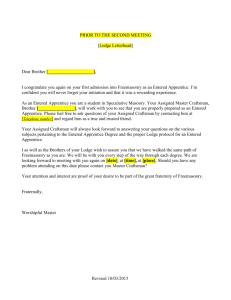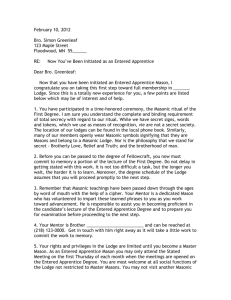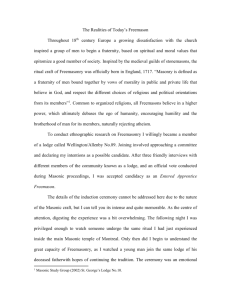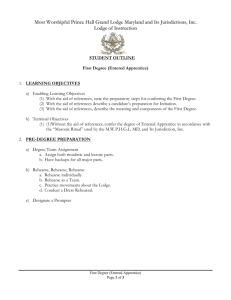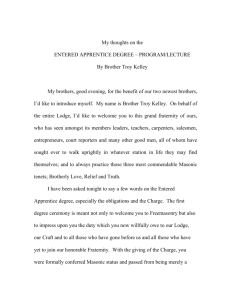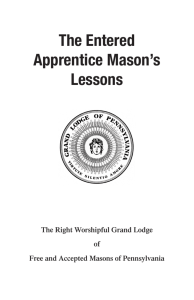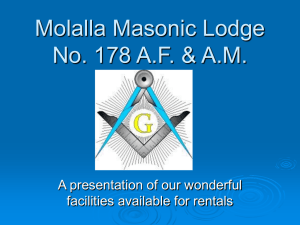Entered Apprentice Mason Study Guide: Freemasonry Basics
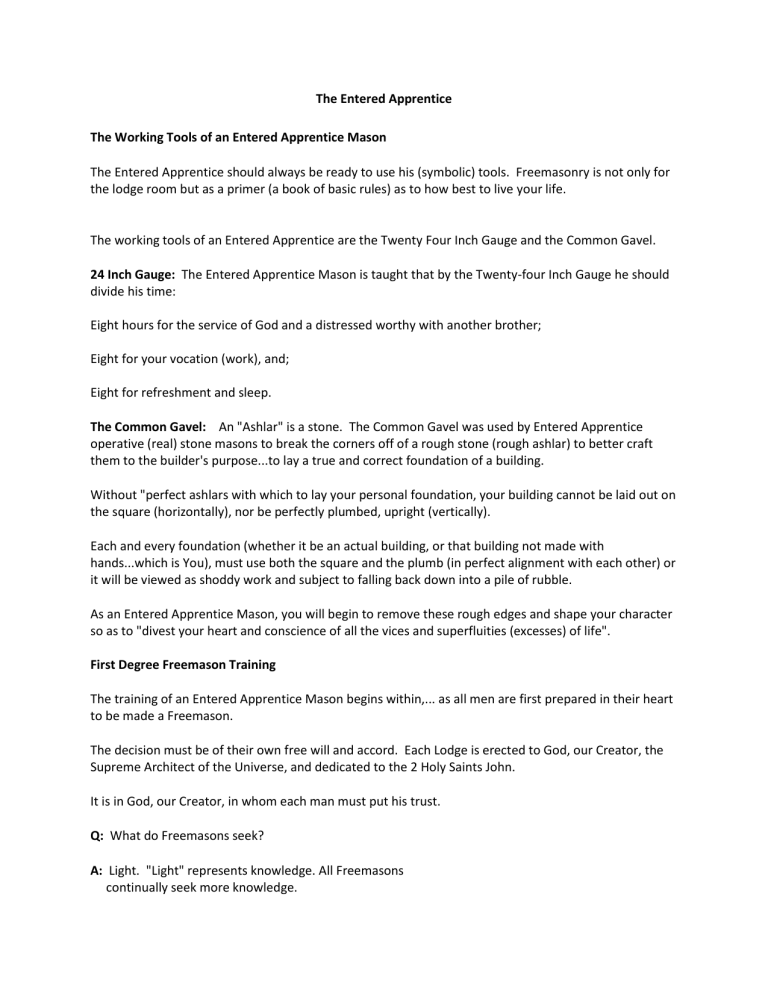
The Entered Apprentice
The Working Tools of an Entered Apprentice Mason
The Entered Apprentice should always be ready to use his (symbolic) tools. Freemasonry is not only for the lodge room but as a primer (a book of basic rules) as to how best to live your life.
The working tools of an Entered Apprentice are the Twenty Four Inch Gauge and the Common Gavel.
24 Inch Gauge: The Entered Apprentice Mason is taught that by the Twenty-four Inch Gauge he should divide his time:
Eight hours for the service of God and a distressed worthy with another brother;
Eight for your vocation (work), and;
Eight for refreshment and sleep.
The Common Gavel: An "Ashlar" is a stone. The Common Gavel was used by Entered Apprentice operative (real) stone masons to break the corners off of a rough stone (rough ashlar) to better craft them to the builder's purpose...to lay a true and correct foundation of a building.
Without "perfect ashlars with which to lay your personal foundation, your building cannot be laid out on the square (horizontally), nor be perfectly plumbed, upright (vertically).
Each and every foundation (whether it be an actual building, or that building not made with hands...which is You), must use both the square and the plumb (in perfect alignment with each other) or it will be viewed as shoddy work and subject to falling back down into a pile of rubble.
As an Entered Apprentice Mason, you will begin to remove these rough edges and shape your character so as to "divest your heart and conscience of all the vices and superfluities (excesses) of life".
First Degree Freemason Training
The training of an Entered Apprentice Mason begins within,... as all men are first prepared in their heart to be made a Freemason.
The decision must be of their own free will and accord. Each Lodge is erected to God, our Creator, the
Supreme Architect of the Universe, and dedicated to the 2 Holy Saints John.
It is in God, our Creator, in whom each man must put his trust.
Q: What do Freemasons seek?
A: Light. "Light" represents knowledge. All Freemasons
continually seek more knowledge.
Q: Will I learn the Masonic secrets in this Entered
Apprentice Mason Study Guide?
A: No. They will be learned in the lodge in which you will
be raised to the Sublime Degree of Master Mason. They are the
grips, penal signs, passwords and ritual work.
Q: Is there a Penalty for an Entered Apprentice Mason Failure
to Memorize the Material?
A: No. There is no penalty assessed by the lodge. If your
jurisdiction requires Entered Apprentice Memorization,
continue to read the rest of this page to receive an
understanding which will assist you in your memorization
work.
If your jurisdiction does not require you to memorize the material, reading the rest of this page will help you to fully understand your obligation, and thus make it easier for you to move forward to the Fellow craft degree.
Q: What is Circumambulation...or, Why Am I Walking in Circles?
A: In the center of the lodge room is an altar on which resides the Holy Book (or Scriptures). Early man circled these altars, on which burned the sacrificial fires which connected him to his Creator. Beginning in the East toward the West by way of the South, circumambulation was a part of all religious observances.
It was performed in the ceremonies of ancient Egypt and down through thousands of other ceremonies throughout history.
When the candidate first circles the lodge room about the altar, he is walking step by step in the same footsteps of every shade of man who has ever existed on Earth...each of whom have worshipped the
Most High by this form of humble imitation.
Circumambulation is not a mere parade or "ring-around-the rosie", but represents a ceremony of sacred significance, linking each and every man who takes part in it with the spiritual aspirations and communion with our Creator, sought by our ancestors, too, long before us.
Circumambulation teaches us that no single man...alone, ...without a true and trusted friend in whom we can confide, can always, unfailingly find his way home. Masonry teaches us that we live and walk by faith, not by sight; and the understanding of that fact is the beginning of wisdom.
In life, as in the lodge, we must walk upright, in humble submission, trust our Guide, (our Creator), learn
His ways, follow Him and fear no danger.
Read this to more fully understand the biblical beginnings of our Masonic Altar.
Rights of An Entered Apprentice
Q: What are the Rights of an Entered Apprentice Mason:
A:
1. He may enter the lodge room only when it is open on the
first degree.
2. He has the right of instruction by competent brethren to
obtain "suitable proficiency in the work of the first degree"
which may make him suitable to receive his 2nd degree.
3. He must be diligent in learning and to the best he is able,
he will suit such time and place of learning to that of his
instructors.
Q: What Rights Has the Entered Apprentice Mason Not Yet Earned?
A:
1. He does not yet pay dues to his lodge.
2. He is not yet permitted to sign its By-Laws.
3. He cannot hold office.
4. He cannot vote or ballot.
5 In some jurisdictions, he cannot receive a Masonic burial
(as is the right of a Master Mason).
6. He cannot attend a Masonic funeral as a member of the lodge.
(He can, however, attend a Masonic funeral as a private person.)
7. He has no right to Masonic charity.
Within the Lodge Room:
7 Master Mason members of a Lodge must be present to “open” a Lodge of Entered Apprentice
Mason.
There are 12 Officers in most lodges. (You read about them, above, in Lodge Officer Duties.)
The Worshipful Master sits in the East.
The Senior Warden sits directly across the room from him...in the West.
The Junior Warden sits in the South.
The North is always dark.
The “3 Great Lights” of the Lodge are the Holy Scriptures, Square and Compasses.
The “ 3 Lesser Lights” represent the Sun, Moon and the Worshipful Master.
A Hoodwink is a blindfold.
A Cable Tow is a cord worn by the Candidate.
The Opening of the Holy Scriptures (Bible or other sacred book/books) signifies the Lodge is
open.
The Patron Saints of Freemasonry are Saints John the Baptist and John the Evangelist.
The significance of the Masonic Entered Apprentice obligation is evidence of the Candidate's sincerity of purpose.
The candidate is divested of all metallic substances to teach him a lesson in Charity.
Just as the first stone of most buildings' foundations was historically laid at the Northeast corner, the Entered Apprentice Mason is placed in the Northeast corner of the Lodge to signify that he is beginning to lay a true and correct foundation for his Masonic journey through life.
3 raps of the Worshipful Master’s gavel mean that everyone should rise.
A Cowan is an eavesdropper who masquerades as a Mason and attempts to steal the secrets of
Freemasonry without having gone through the necessary Masonic education to fully obtain
their true meaning and usefulness.
The apron flap of an Entered Apprentice Mason is turned up.
This represents the operative Entered Apprentice Mason of old who were bearers of burden and turned their apron flap up to prevent them from soiling their clothes while performing their operative stone mason work.
The single number which is most often seen and used within Freemasonry is the number 3.
The 3 "Supports" of the Lodge are Wisdom, Strength and Beauty
Basic Summary of What You Have Learned:
Via the Entered Apprentice Mason degree, the initiate is taught the necessity of a belief in God; of charity toward all mankind, "more especially a brother Mason"; of secrecy; the meaning of brotherly love; the reasons for relief; the importance of truth; the advantages of temperance; the value of fortitude; the peace and safety provided by prudence, and the equality of strict justice.
He is charged to be reverent before God, to pray to Him for help, to venerate Him as the source
of all that is good. He is exhorted to avoid excesses of all kinds and to practice the Golden Rule.
He is admonished to be quiet and peaceable, not to countenance disloyalty and rebellion; to be true and just to both his government and his country; to be cheerful under its laws.
The Entered Apprentice Mason is charged to come often to lodge, but not to neglect his business; not to argue about Freemasonry with the ignorant, the profane (without Temple...or in other words, the non-Mason) nor anyone with Anti-Masonic sentiments.
It is his obligation to learn Freemasonry and to keep Freemasonry's secrets, ...secret.
